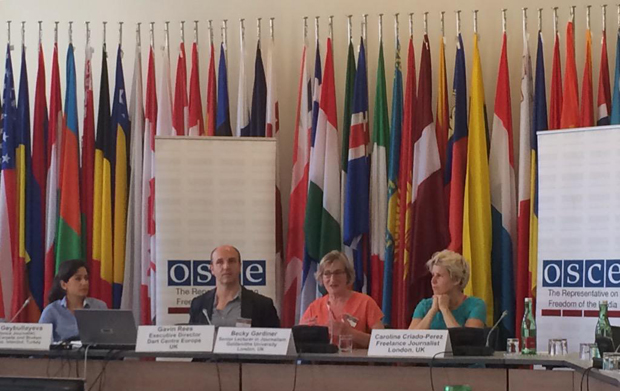Online harassment against women is not just a female problem

Panelists at the OSCE meet on online attacks against journalists: writer Arzu Geybulla; Gavin Rees, Europe director of the Dart Center for journalism and trauma; Becky Gardiner, from Goldsmiths, University of London; journalist Caroline Criado Perez
“This is not something that only ‘ladies’ can fix,” emphasised Dunja Mijatovic, the OSCE’s Representative on Freedom of the Media at an expert meeting on the safety of female journalists in Vienna on 17 September 2015, which Index on Censorship attended.
The importance of collectively tackling the growing problem became an overarching theme of the conference. “There is a new and alarming trend for women journalists and bloggers to be singled out for online harassment,” said Mijatovic, while highlighting the importance of media, state and NGO voices coming together to address the abuse.
Arzu Geybulla and Caroline Criado Perez, journalists from Azerbaijan and the UK respectively, started the meeting with moving testaments of their own experiences. Despite covering very different topics, they have received shockingly similar threats – sexual, violent and personal. “Shut your mouth or I’ll shut it for you and choke you with my dick” was one of the messages received by Perez after she campaigned for a woman to feature on British banknotes.
Although male journalists also receive abuse, women experience a two-fold attack, including the gendered threats. Think tank Demos has estimated that female journalists experience roughly three times as many abusive comments as their male counterparts on Twitter.
The problem, said Perez, was not just the threats but how the women who receive them are then treated. “Women are accused of being mad or attention seeking, which are all ways of delegitimising women’s speech,” she said. “People told me to stop, close my Twitter account, go offline. But why is the solution to shut up?” She added: “This is a societal problem, not an internet problem.”
“Labelling a person, and making that person an object, is particularly common in Azerbaijan,” said Geybulla, an Azeri journalist and Index on Censorship magazine contributor who was labelled a traitor and viciously targeted online after writing for a Turkish-Armenian newspaper. “Our society is not ready to speak out. You can’t go to the police. The police think it must be your fault.”
The intention of the meeting was to highlight the problem, while also proposing courses of actions. Suggestions included calls for more education in digital literacy; more training for police; more support from editors and media organisations, and from male colleagues. There was some disagreement on whether the laws were robust enough as they stand, or needed an update for the internet age.
Becky Gardiner, formerly editor of Guardian’s Comment is Free section, spoke about how her own views on dealing with online abuse had changed, having initially told writers they should develop a thicker skin. “It is not enough to tell people to get tough. Disarming the comments is not a solution either. That genie is out of the bottle.” Gardiner, who is now a lecturer at Goldsmiths, University of London, is working on research into the issue, as commissioned by the Guardian’s new editor, Kath Viner.
It was suggested that small but crucial steps could be taken by media organisations to avoid inflammatory and misleading headlines (which are not written by the journalist, but put them in the firing line) and to be careful of exposing inexperienced writers without preparation or support. Sarah Jeong from Vice’s Motherboard plaform said, in her experience, freelancers often came the most under attack because they don’t have institutional backing.
The OSCE said this will be the first in a series of meetings, with the aim of getting more organisations to take it serious and to produce more concrete courses of action.
Read more about the online abuse of women in the latest issue of Index on Censorship magazine, with a personal account by Gamergate target Brianna Wu and a legal overview by Greg Lukianoff, president of the Foundation for Individual Rights in Education (Fire).
Tweets from OSCE’s #FemJournoSafe conference:
RT @IWMF Gavin Rees: "As an industry, we need to have the discussion" about how to deal with online abuse of journalists #FEMjournosafe
— The Dart Center for Journalism & Trauma (@DartCenter) September 17, 2015
Online threats against female journos is not a "women's issue" its rooted in misogyny & affects us all #FEMjournosafe pic.twitter.com/6Geh4oo9ez
— INSI (@INSInews) September 17, 2015
RT @bethelmckenzie: Several speakers @OSCE_RFoM #FEMjournosafe have mentioned how online harassment is often even worse for minority women
— GenderIT.org (@GenderITorg) September 18, 2015
.@sarahjeong.@motherboard: silence is complicity! Male editors should react/condemn harassment of female journalist employees #FEMjournosafe
— Deniz Wagner (@wagner_deniz) September 17, 2015
@google rep: the key to addressing online abuse is counter speech and better moderation mechanisms. #FEMjournosafe @OSCE_RFoM #freespeech
— Judy Taing (@judytaing) September 17, 2015
Women often don't report online harassment. True. I know firsthand. #FEMjournosafe @OSCE_RFoM
— Alison Bethel (@bethelmckenzie) September 17, 2015
@sarahjeong: Online attacks can ruin journo's reputation/relationships. @alanabarton: it can make women leave job #FEMjournosafe @OSCE_RFOM
— Alison Bethel (@bethelmckenzie) September 17, 2015
https://twitter.com/julieposetti/status/644456066432937984
A day after #femjournosafe I am still thinking about horrifying quotes of online harrasment I've heard from female journalists. End #VAW.
— AIDA (@Aidazzles) September 18, 2015
